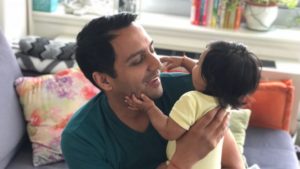Anekantavad is a sanskrit word meaning multiplicity of viewpoint —through understanding and taking in all perspectives, one can find the truth. This tenant is thousands of years old.
When my husband Hemal and I visited one of my Guru’s he said, “One of you stand on the right and the other stand on the left side of this statue. When you look at it, what do you see?”
This particular statue was unique, it was of a god. No matter where you sat in the room when you looked at the statue, the eyes seemed to look straight at you.
Then my Guru asked us, “Who is the statue looking at?” Hemal said, “It’s looking at me” and I said, “It’s looking at me.” Then he asked, “Who’s right and who’s wrong?”
Hemal and I simultaneously said we’re both right, and my Guru said, ”Or you’re both wrong. Maybe the statue is looking at me.”
The point was there are so many different ways to view the exact same thing. That’s what the tenant of Anekantavad means, and as you learn the various perspectives, you can find the truth.
However, most of us seem to only be curious about our own perspective. Without even trying to see another side or another viewpoint, we immediately think our picture of the world is right. Many of us will even fight to be right, or get offended when someone doesn’t see it our way. That’s the ego.
When it comes to love and relationships, the ego is what keeps us from true connection and intimacy with one another. It doesn’t allow us to be present or fluid with ourselves or others to find truth.
It has us saying things like this:
- I don’t reach out first ever; I let someone come to me.
- If she hasn’t responded why should I? If she cares she’ll reach out.
- I don’t really need anyone. I can do it on my own.
- Always keep the upper hand, never let someone know you like them.
- Why hasn’t he made me a priority?
- Why can’t he read my mind and just know what I want?
- I’ve done so much, why doesn’t she appreciate that?
- If they aren’t showing up for me, then why should I show up for them?
- If he really loved me then he would agree with me.
The ego wants to control and fixate on what feels safe, versus venture into the unknown. Feeling safe means not putting yourself out there, so you never have to get hurt.
This mentality keeps us in a cycle of feeling unloved, separate and like we’re different from everyone else.
Instead of seeing how we are all interdependent, and truly one.
Now, I’m not saying the ego is bad. In fact without it, we wouldn’t have an identity so it’s essential.
But it’s important to know when it’s keeping you from seeing what’s true or from understanding others. Anekantavad.
Now, to know how to tame the ego we have to understand where it came from.
You see, as a child you’re dependent on your parents and the world to keep you alive. The brain sees them as perfect because if they are flawed in someway, that would mean that you could die because you can’t survive without them.
As children, when we don’t get what we want in the way we need it, we make it mean there’s something wrong with us because that’s what feels safe to the mind.
But little by little, this causes us to question how worthy we are of what we desire. We then create beliefs about ourselves and the world because we did or didn’t get what we want.
These beliefs get stored in the subconscious. Some of these beliefs we are aware of, many we aren’t.
As these beliefs about our worth get created, slowly we shut our feelings and hearts down and the ego takes over.
The question then becomes, how do we get back to opening our hearts and knowing we are worthy of what we desire in love?
Here’s the answer.
By being curious, open and willing to uncover those beliefs of unworthiness that we may not be aware of and pinpoint where they originated….through your family and childhood experiences.
You may question if someone really loves you.
You may question if someone respects you.
You may question if those closest to you really know you.
You may question if anyone will ever choose you.
These are just some examples of beliefs that may have been created in your childhood; they can come in all shapes and sizes. And these beliefs push love away, and keep you from receiving all the love around you.
What are some of your beliefs about being loved?
And where in your family did they come from when you were younger? I promise there is some connection. You may have to dig.
Lastly, ask yourself if you’re open to seeing people and situations that created those beliefs differently.
This is where Anekantavad is key, because it’s the process that has you start to say, “I’m curious about what I don’t know. And I’m committed to releasing these belief so that I can start to receive love in profound ways and feel free to give it too.”
In Love,













